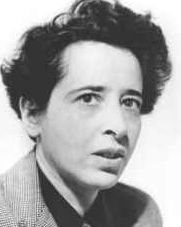

He had read the book and agreed that Arendt had not made that point exactly. I called such questions directed to the witnesses in Jerusalem both foolish and cruel.


Hausner of the Israeli public prosecutor’s office. Someone else did that in the Eichmann trial, namely Mr.

Nowhere in my book did I reproach the Jewish people with nonresistance. Without hesitation, Arendt corrected Gaus:įirst of all, I must, in all friendliness, state that you yourself have become a victim of this campaign. Gaus acknowledged that Arendt had already addressed these critics, by saying their comments were, in some cases, based on a misunderstanding and, in others, part of a political campaign against her, but he had already crossed a contested border. “Above all,” said Gaus, “people were offended by the question you raised of the extent to which Jews are to blame for their passive acceptance of the German mass murders, or to what extent the collaboration of certain Jewish councils almost constitutes a kind of guilt of their own.” What Gaus especially wanted to know was what Arendt thought about criticism levied against her by Jews angered by her portrait of Eichmann and her comments about Jewish leaders and other Jewish victims of the Holocaust. Arendt’s Eichmann in Jerusalem: A Report on the Banality of Evil, her controversial analysis of the Jerusalem trial of Adolf Eichmann, had just been published in German in the Federal Republic and Gaus used the occasion to generate a “portrait of Hannah Arendt.” The interview ranged across a wide field of topics, including the difference between philosophy and politics, the situation in Germany before and after the war, the state of Israel, and even Arendt’s personal experiences as a detainee in Germany and France during the Second World War.Īlready a cause célèbre in the United States, the book had brought Arendt lavish praise and no small amount of damnation. Fifty years ago, on October 28, 1964, a televised conversation between the German-Jewish political theorist, Hannah Arendt, and the well-known German journalist, Günter Gaus, was broadcast in West Germany.


 0 kommentar(er)
0 kommentar(er)
